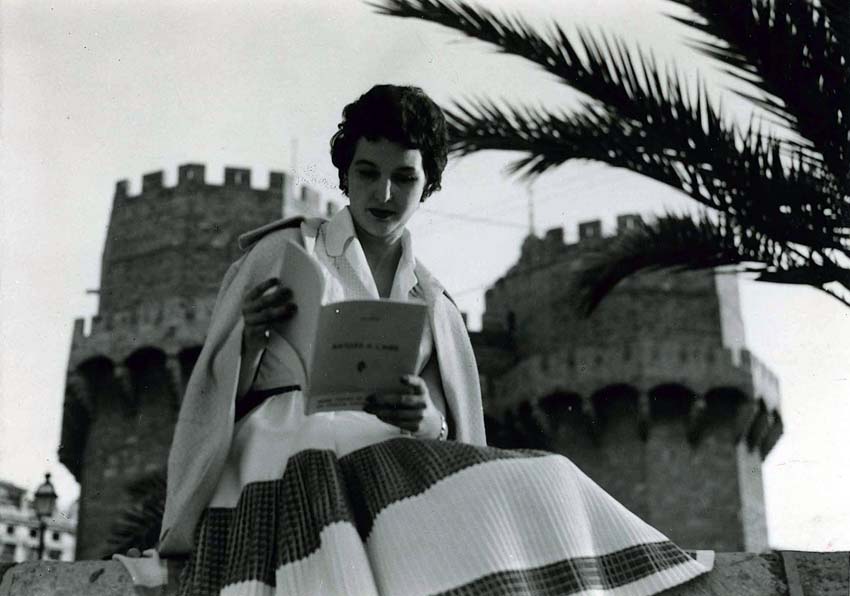
A Vinyet Panyella i Balcells conference. La Nau Cultural Centre
Escola Europea de Pensament Lluís Vives
Conference series Maria Beneyto, l'escriptura forta i múltiple
Conference “María Beneyto, poeta. Una reivindicación” (María Beneyto, poet. A recognition)
Held by
Vinyet Panyella i Balcells. Writer and cultural researcher
Presented by
Josep Ballester-Roca
Full-time university professor of the Language and Literature Didactics department of the Universitat de València
Vinyet Panyella, born in Sitges, is a writer, cultural researcher and curator of exhibitions.
She has been president of the Consell Nacional per a la Cultura i les Arts of Catalonia (2019-2024); director of the Sitges Museums (2011-2019); general manager (1989-1996) and director of the Biblioteca de Catalunya (2000-2004), among other responsibilities within the documentary and heritage fields of the public sector.
She has published 40 works: poetry (17), biographies, essays, artistic and literary studies, as well as numerous texts, catalogues and articles. Her poems have been translated to multiple languages and are included in anthologies ever since 1995 until the present day. A new book of poems, Llum abissal, is to be published this spring.
As a researcher, she has specialised in cultural, literary and artistic history, focusing on studies from Santiago Rusiñol, Miquel Utrillo, Ramon Casas, Joaquim Sunyer and Picasso, to artists Lola Anglada and Angeles Santos, or the poets J. V. Foix and Rosa Leveroni. among others. She has recently curated, jointly with E. Trent, the exhibition De Montmartre a Montparnasse. Artistes catalans a París, 1889-1914 (Museu Picasso, Barcelona, 21.11.2024- 30.03.2025). She is currently finishing her study about the poet Joan Salvat-Papasseit.
In 1999 she published the anthology Contemporànies. Poetes dels Països Catalans, which began a line of research on Catalan poetry written by women, and continued writing about Simona Gay, Rosa Leveroni, Mercè Rodoreda or Montserrat Abelló, among others.
Since 1998 she comes up with and maintains the literary and cultural column El Marge Llarg at the centenary weekly L’Eco de Sitges, and since 2006 she has the web vlog Quadern de Terramar.
Synopsis
María Beneyto, poeta. Una reivindicación
From a current perspective, the poetic work in Valencian of Maria Beneyto (1920-2011) stands as one of the strongest and most unique voices not just among her generation, but among the literary system as a whole. However, her presence and visibility does not align with her relevance and contributions with regards to the poetics of her century. One must add that, literature written by women, specially the works of those who wrote and published during the Franco regime, still lacks of any relevant presence within the publishing and academic world. Several decades had to pass so that critical editions and complete works of poets such as Mercè Rodoreda or Rosa Leveroni finally appeared, which have been posthumous collections.
The complete poetry work of Beneyto will be published this year, in commemoration of her centenary, allowing us to appreciate her contribution within the poetic panorama of the second half of the twentieth century. Beneyto was one of the brightest personalities of the 50s generation and didn’t suffer from generational lag like other cotemporary poets such as Montserrat Abelló, Felícia Fuster or Maria Àngels Anglada, whose poetic works take place a couple decades after than their male cotemporaries. In Beneyto’s case, and despite her constant dedication to literature, the undeniable quality of her work, the awards won and a permanent lyrical poetry calling, her literary work, and poetry in particular, have been subjected to a double discrimination, linguistic and due to gender, a completely unjustifiable silencing, yet extremely common. As so it happens with Maria Ibars, Matilde Llória or Carmelina Sánchez-Cutillas.
The conference Maria Beneyto, poeta. Una reivindicació is laid out as a reading of the Valencian poetic work from a current perspective in which her lyrical voice presents with solemn sincerity the problem of the apparently strong woman – “la dona forta” is the picture that characterises her – from the double experience of love and the pain it produces, the sad affection of a non-existent maternity, the reaffirmation of her will to be despite the denied freedom. The contemporaneity of the topics of her lines and the lyrical strength of her diction justify, if anything, the recognition a work comparable to one of the best poets of her century.
Free entry, limited capacity
Date 3 april 2025 at 19:00 to 20:30. Thursday.
Aula Magna. Centre Cultural La Nau
Carrer de la Universitat, 2
València (46003)
Escola Europea de Pensament Lluís Vives, Servei de Cultura Universitària UV.




